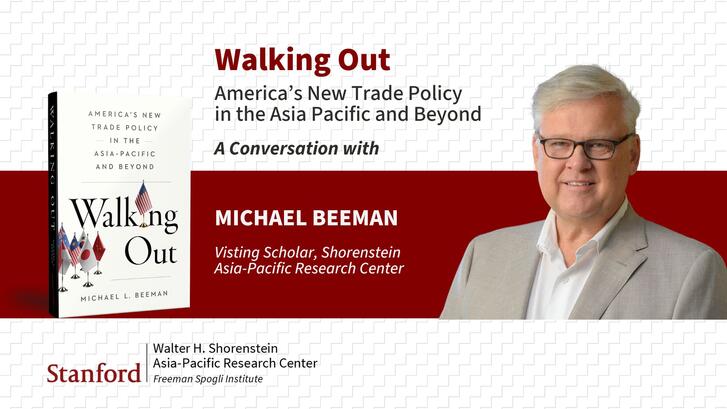The November 2024 U.S. presidential election is projected to have profound implications for the world. In the Asia-Pacific region, the outcomes and subsequent policy priorities could significantly change global alliances and the region’s geopolitical and economic landscape. Kamala Harris and Donald Trump offer substantially different approaches to bilateral and multilateral cooperation that would have divergent impacts on trade relations, security partnerships, and diplomatic ties with Washington at a time in which U.S.-Asia engagement remains crucial for regional security, economic development, humanitarian assistance, technological innovation, and climate action.
Join a panel of experts on democracy, international relations, human rights, trade, and development to explore the potential opportunities and risks the next U.S. administration’s policies may pose for the Asia-Pacific and how stakeholders in the region look at their future with the United States.
This event is part of APARC's Contemporary Asia Seminar Series, which hosts professionals in public and foreign policy, journalism, and academia who share their perspectives on pressing issues facing Asia today.
Panelists:
Francis Fukuyama is the Olivier Nomellini Senior Fellow at Stanford University's Freeman Spogli Institute for International Studies (FSI), and a faculty member of FSI's Center on Democracy, Development and the Rule of Law (CDDRL). He is also Director of Stanford's Ford Dorsey Master's in International Policy, and a professor (by courtesy) of Political Science. Dr. Fukuyama has written widely on issues in development and international politics. His 1992 book, The End of History and the Last Man, has appeared in over twenty foreign editions. His book Identity: The Demand for Dignity and the Politics of Resentment, was published in 2018. His latest book, Liberalism and Its Discontents, was published in May 2022.
Fukuyama received his B.A. from Cornell University in classics, and his Ph.D. from Harvard in Political Science. He was a member of the Political Science Department of the RAND Corporation and of the Policy Planning Staff of the U.S. Department of State. From 1996-2000 he was Omer L. and Nancy Hirst Professor of Public Policy at the School of Public Policy at George Mason University, and from 2001-2010 he was Bernard L. Schwartz Professor of International Political Economy at the Paul H. Nitze School of Advanced International Studies, Johns Hopkins University.

Kiyoteru Tsutsui is the Henri H. and Tomoye Takahashi Professor and Senior Fellow in Japanese Studies at Shorenstein APARC, the Director of the Japan Program and Deputy Director at APARC, a senior fellow of the Freeman Spogli Institute for International Studies, and Professor of Sociology, all at Stanford University. Tsutsui received his bachelor’s and master’s degrees from Kyoto University and earned an additional master’s degree and Ph.D. from Stanford’s sociology department in 2002. Tsutsui’s research interests lie in political/comparative sociology, social movements, globalization, human rights, and Japanese society. His most recent publication, Human Rights and the State: The Power of Ideas and the Realities of International Politics (Iwanami Shinsho, 2022), was awarded the 2022 Ishibashi Tanzan Award and the 44th Suntory Prize for Arts and Sciences.

Gita Wirjawan is a visiting scholar at Stanford University’s Precourt Institute for Energy and formerly a visiting scholar at APARC. His public service has included positions as Indonesia’s minister of trade, chairman of its Investment Coordinating Board, and chair of a 159-nation WTO ministerial conference in 2012 that focused on easing global trade barriers.
As an investment banker, he has held key appointments at Goldman Sachs and JPMorgan, where he led many mergers, corporate restructuring, corporate financing, and strategic sales involving leading companies in Southeast Asia. Having established a successful investment business in Indonesia, the Ancora Group, he created the Ancora Foundation, which has endowed scholarships for Indonesians to attend high-ranked universities worldwide and has funded the training of teachers at hundreds of Indonesian kindergartens serving underprivileged children.
Gita hosts the educational podcast “Endgame” to promote Southeast Asia’s growth and prosperity. His degrees are from the Harvard Kennedy School (MPA), Baylor University (MBA), and the University of Texas at Austin (BSc).
Moderator:
Gi-Wook Shin is the William J. Perry Professor of Contemporary Korea, a professor of sociology, and a senior fellow at the Freeman Spogli Institute for International Studies at Stanford University. At Stanford, he has also served as director of the Walter H. Shorenstein Asia-Pacific Research Center since 2005 and as founding director of the Korea Program since 2001. His research concentrates on nationalism, development, and international relations, focusing on Korea/Asia.
Shin is the author/editor of more than 25 books, including South Korea’s Democracy in Crisis: The Threats of Illiberalism, Populism, and Polarization; The North Korean Conundrum: Balancing Human Rights and Nuclear Security; Global Talent: Foreign Labor as Social Capital in Korea; and One Alliance, Two Lenses: U.S.-Korea Relations in a New Era. Shin’s latest book, The Four Talent Giants, a comparative study of talent strategies of Japan, Australia, China, and India, will be published by Stanford University Press in 2025.
In Summer 2023, Shin launched the Stanford Next Asia Policy Lab (SNAPL), which is committed to addressing emergent social, cultural, economic, environmental, and political challenges in Asia through interdisciplinary, problem-oriented, policy-relevant, and comparative studies and publications. He also launched the Taiwan Program at APARC in May 2024.
Shin previously taught at the University of Iowa and the University of California, Los Angeles. He holds a BA from Yonsei University and an MA and PhD from the University of Washington.



 FSI researchers strive to understand how countries relate to one another, and what policies are needed to achieve global stability and prosperity. International relations experts focus on the challenging U.S.-Russian relationship, the alliance between the U.S. and Japan and the limitations of America’s counterinsurgency strategy in Afghanistan.
FSI researchers strive to understand how countries relate to one another, and what policies are needed to achieve global stability and prosperity. International relations experts focus on the challenging U.S.-Russian relationship, the alliance between the U.S. and Japan and the limitations of America’s counterinsurgency strategy in Afghanistan.


















